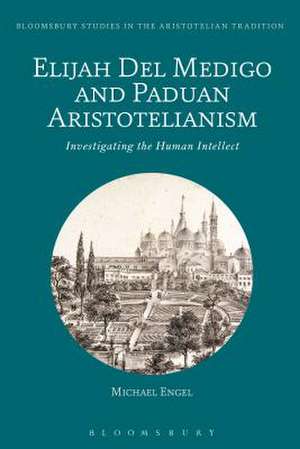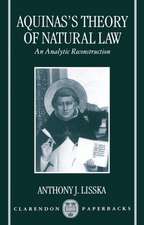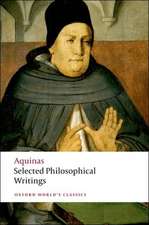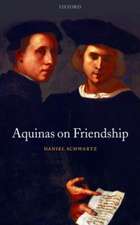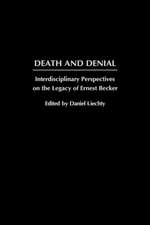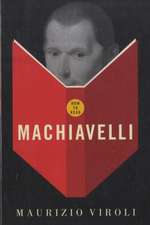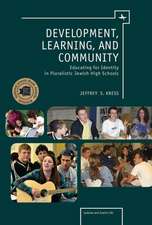Elijah Del Medigo and Paduan Aristotelianism: Investigating the Human Intellect: Bloomsbury Studies in the Aristotelian Tradition
Autor Michael Engelen Limba Engleză Paperback – 30 mai 2018
| Toate formatele și edițiile | Preț | Express |
|---|---|---|
| Paperback (1) | 236.45 lei 6-8 săpt. | |
| Bloomsbury Publishing – 30 mai 2018 | 236.45 lei 6-8 săpt. | |
| Hardback (1) | 772.81 lei 6-8 săpt. | |
| Bloomsbury Publishing – 16 noi 2016 | 772.81 lei 6-8 săpt. |
Din seria Bloomsbury Studies in the Aristotelian Tradition
- 20%
 Preț: 219.57 lei
Preț: 219.57 lei -
 Preț: 193.36 lei
Preț: 193.36 lei - 23%
 Preț: 191.22 lei
Preț: 191.22 lei - 23%
 Preț: 191.31 lei
Preț: 191.31 lei - 14%
 Preț: 512.22 lei
Preț: 512.22 lei - 30%
 Preț: 511.48 lei
Preț: 511.48 lei - 22%
 Preț: 239.85 lei
Preț: 239.85 lei - 22%
 Preț: 230.51 lei
Preț: 230.51 lei - 13%
 Preț: 222.55 lei
Preț: 222.55 lei - 21%
 Preț: 216.99 lei
Preț: 216.99 lei - 23%
 Preț: 199.10 lei
Preț: 199.10 lei - 23%
 Preț: 198.12 lei
Preț: 198.12 lei - 23%
 Preț: 198.57 lei
Preț: 198.57 lei - 30%
 Preț: 510.42 lei
Preț: 510.42 lei - 30%
 Preț: 510.49 lei
Preț: 510.49 lei - 30%
 Preț: 511.14 lei
Preț: 511.14 lei - 30%
 Preț: 511.48 lei
Preț: 511.48 lei -
 Preț: 250.59 lei
Preț: 250.59 lei
Preț: 236.45 lei
Preț vechi: 305.08 lei
-22% Nou
Puncte Express: 355
Preț estimativ în valută:
45.25€ • 49.13$ • 38.01£
45.25€ • 49.13$ • 38.01£
Carte tipărită la comandă
Livrare economică 23 aprilie-07 mai
Preluare comenzi: 021 569.72.76
Specificații
ISBN-13: 9781350074408
ISBN-10: 1350074403
Pagini: 208
Dimensiuni: 156 x 234 x 18 mm
Greutate: 0.3 kg
Ediția:NIPPOD
Editura: Bloomsbury Publishing
Colecția Bloomsbury Academic
Seria Bloomsbury Studies in the Aristotelian Tradition
Locul publicării:London, United Kingdom
ISBN-10: 1350074403
Pagini: 208
Dimensiuni: 156 x 234 x 18 mm
Greutate: 0.3 kg
Ediția:NIPPOD
Editura: Bloomsbury Publishing
Colecția Bloomsbury Academic
Seria Bloomsbury Studies in the Aristotelian Tradition
Locul publicării:London, United Kingdom
Caracteristici
The first book length study dedicated to the philosophy of Del Medigo, a key figure in Jewish Renaissance Aristotelianism
Notă biografică
Michael Engel is a Research Associate at the Institute for Jewish Philosophy and Religion, University of Hamburg, Germany.
Cuprins
AcknowledgementsIntroduction1. Historical and Philosophical Background2. Del Medigo on the Material Intellect 3. Del Medigo on the Agent Intellect 4. Del Medigo on Conceptualisation 5. Hic Homo Intelligit?ConclusionAppendix I: The Works of Elijah Del MedigoAppendix II: Del Medigo's Theory of IntellectNotesBibliographyIndex
Recenzii
Michael Engel makes a substantial contribution to previous scholarship on the treatise, mastering for the first time its linguistic difficulties, its philosophical complexity and its reliance on Latin scholasticism and Hebrew sources. With an impressively lucid and penetrating analysis, Engel skillfully guides his readers through intricate issues of intellect theory without losing the thread of the argument.
With admirable clarity, Michael Engel provides an access key to understanding the Two Investigations on the Intellect, one of the most important works by Elijah Del Medigo, no longer extant in Latin, but still preserved in Hebrew. Engel's book fills a significant gap in the history of Renaissance Philosophy, and will stimulate further research on this long-overlooked figure, whose own fame has been obscured by his patron Giovanni Pico della Mirandola.
Dr Engel's study constitutes an important contribution to the study of Averroes both in the Hebrew and in the Latin tradition. Examining an unpublished text and focusing on the intellectual context in which Del Medigo worked, it greatly enhances our knowledge of this author, since scholarly attention has hitherto mainly focused on Del Medigo's more popular treatise on the relation between religion and philosophy Behinat ha-Dat ('The Examination of Religion'). This book presents and explains the often quite involved philosophical debates of the Renaissance in a lucid manner.
Engel shows that Del Medigo, though an Averroist, is distinctive in his Averroism, because of his unique access to him through both the Jewish and the Latin tradition. As a result, he makes us rethink, not just Paduan Aristotelianism, but the whole relationship between Jewish and Christian philosophers in the later Middle Ages.
With admirable clarity, Michael Engel provides an access key to understanding the Two Investigations on the Intellect, one of the most important works by Elijah Del Medigo, no longer extant in Latin, but still preserved in Hebrew. Engel's book fills a significant gap in the history of Renaissance Philosophy, and will stimulate further research on this long-overlooked figure, whose own fame has been obscured by his patron Giovanni Pico della Mirandola.
Dr Engel's study constitutes an important contribution to the study of Averroes both in the Hebrew and in the Latin tradition. Examining an unpublished text and focusing on the intellectual context in which Del Medigo worked, it greatly enhances our knowledge of this author, since scholarly attention has hitherto mainly focused on Del Medigo's more popular treatise on the relation between religion and philosophy Behinat ha-Dat ('The Examination of Religion'). This book presents and explains the often quite involved philosophical debates of the Renaissance in a lucid manner.
Engel shows that Del Medigo, though an Averroist, is distinctive in his Averroism, because of his unique access to him through both the Jewish and the Latin tradition. As a result, he makes us rethink, not just Paduan Aristotelianism, but the whole relationship between Jewish and Christian philosophers in the later Middle Ages.
